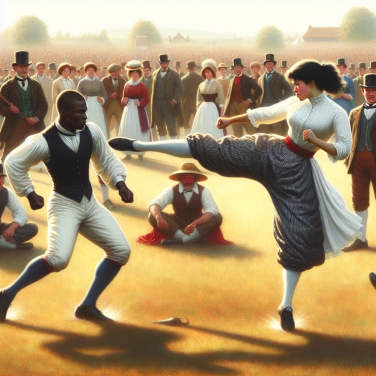Tracing the Origins of the Term 'Pitch' in Soccer
The term 'pitch', commonly used to describe a soccer field, has become so embedded in our language that it's often used without question. So, when and how did the term 'pitch' come to be used in relation to soccer? What are its origins and historical context? This exploration will unveil the story behind this term and its inclusion in the world of soccer.
The roots of the term 'pitch' can be traced back to medieval Europe, specifically England. In that era, village games akin to football were rather popular. The games were not as organized or systematic as today’s football, this early form being more of a chaotic, often violent, village rivalry. The area or ground where these games took place was referred to as a 'pilch', a British term derived from Old English ‘pilche’, meaning ‘skin’ or ‘hide’.
Originally, the term 'pilch' was primarily used to denote grounds where games featuring ball and goal post were played. Over time, as the English language evolved, the term 'pilch' evolved into 'pitch', and gradually started to be exclusively associated with football games and, by extension, to any field meant for organized sports like cricket and rugby.
The development and formalization of football in the mid-19th century, particularly in England, played a significant role in consolidating the usage of the term 'pitch'. An important milestone was the formation of the Football Association in 1863 in England. This heralded the era of organized football, where matches were played on specified grounds or ‘pitches’. As rules and regulations took shape, defining the dimension of the playing field as a mandatory requirement led to the further popularization of the term 'pitch'. Once these standards transformed into the fine print of football legislation, the term 'pitch' soon gained universal acceptance in the football lexicon.
Intrinsic to its usage in the soccer context, 'pitch' also denotes the quality, condition, and characteristics of the playing surface. It's a comprehensive term that distinguishes between soft, hard, uneven, or soggy grounds or pitches. This dimensional facet of the term 'pitch' has roots in the cricketing world, where the condition and intricacy of the pitch have always been a crucial part of the game.
The term 'pitch', however, is not used universally.
Read also:
Unlocking the Mysteries of Horseshoes: Tradition and Science
Cultural Influence on the Football Field: Understanding the Use of the Word 'Pitch'
World football originated in England, and the sport has consistently adopted and maintained British terminologies such as 'football', 'match', and 'pitch'. While these terms are universally used around the globe, the term 'pitch' is often misunderstood or ignored due to cultural differences.
Broadly speaking, the word 'pitch' in sport refers to the field where the game is played. The use of the term 'pitch' in football shows the profound impact of British culture on the sport. This is especially noticeable because, in American English, a 'pitch' generally refers to the act of throwing a baseball in Baseball.
The etymology of the word 'pitch' is complex. The English language is known for borrowing words from other languages, adapting their meanings, or inventing completely new words. 'Pitch', no doubt, follows this tradition. However, in the case of football, it specifically refers to the marked area on the ground where the game is played. Its usage was first recorded in England in 1785.
The difference in American and British English also marks the cultural influence on the sport. In America, football refers to a completely different sport where hand-egg shaped ball, helmets and distinctive play style are the focus. The word 'soccer', an American term, is taken from 'Association Football', the original name of the sport in England, and the place where the action unfolds is usually referred to as a 'field' rather than a 'pitch'.
The usage of these unique football terms also has a lot to do with the cultural significance attached to the sport. The resilience of the term 'pitch' signifies the strong influence of European, particularly British culture on football, and its widespread adoption stands as a testament to the global reach of the sport.
In addition, the distinct use of the term in football can be attributed to the historical evolution of the game. As the sport of football was codified in England during the 19th century, British terminology naturally became the common language of the sport.
To further elaborate, historically, the term 'pitch' doesn't solely pertain to sports. It originally denoted a patch of ground that was – quite literally – 'pitched', or was covered in pitch, a kind of resin derived from plants or petroleum, to provide a solid, even foundation. This facet further solidifies the cultural influence on the sport, as this usage was common in England, where the sport originated.




